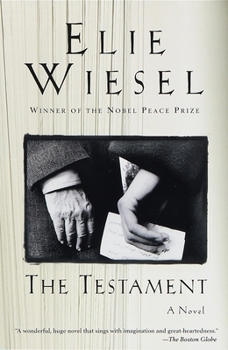The Testament
Select Format
Select Condition 
Book Overview
On August 12, 1952, Russia's greatest Jewish writers were secretly executed by Stalin. In this remarkable blend of history and imagination, Paltiel Kossover meets the same fate but, unlike his real-life counterparts, he is permitted to leave a written testament. From a Jewish boyhood in pre-revolutionary Russia, Paltiel traveled down a road that embraced Communism, only to return to Russia and discover a Communist Party that had become his mortal enemy. Two decades later, Paltiel's son, Grisha, reads this precious record of his father's life and finds that it illuminates the shadowed planes of his own. Passionate and fierce, this story of a father's legacy to his son revisits some of the most dramatic events of our century, and confirms yet again Elie Wiesel's stature as "a writer of the highest moral imagination" ( San Francisco Chronicle ).
Format:Paperback
Language:English
ISBN:0805211152
ISBN13:9780805211153
Release Date:April 1999
Publisher:Schocken Books Inc
Length:352 Pages
Weight:0.78 lbs.
Dimensions:0.9" x 5.6" x 8.5"
Customer Reviews
2 ratings
Finding Words Among the Silent
Published by Thriftbooks.com User , 18 years ago
Elie Wiesel has proven himself to be a master storyteller, taking real life accounts and events, and turning them into haunting literature. While the focus of "The Testament" is not the Holocaust, as is the focus of many of his other works, Jewish history and what happens to the Jews in WWII plays a large role. "The Testament" bears Wiesel's trademark stylings, the shifting back and forth between time, that brings past and present together, and a son trying to come to terms with his father's life, a father he was never able to know. "The Testament" is the 'confession' of sorts of the main character, Palatiel Kossover. Palatiel was a Russian-born Jew who traded in his faith for communism while he was a teenager. He devoted his life to words to stir the party to action, taking part in the fighting in Spain and Russia, fighting against the Nazis. Yet upon returning to Russia after the war, he finds the party isn't what he once believed in, and soon finds himself a hunted man because of what he has said and printed. It is while he is in prison that he writes out his testment, a long letter to a son he shall never see again. Palatiel's story is intersected with that of his son Grisha, a young mute estranged from his mother and desperate to learn of his father. When a mutual friend informs him of his father's past, Grisha knows that it is his task to tell people of his father, to bring his father back to life. Normally the stylings of Wiesel's novels work for him - the shifts back and forth between time in "The Testament" get too bogged down with characters, who because of espionage related reasons, have more than one name. This can make it difficult for readers to follow all of Palatiel's movements and associations during the war. Yet despite that, "The Testament" is as powerful of a work as any Wiesel has written. It explores and exposes what is really at the heart of human nature, and how in the midst of desolation, hope can live on no matter how desperately it is being crushed.
The Testament - A Weisel Sleeper
Published by Thriftbooks.com User , 25 years ago
Weisel delved deep into the complex nature of humans and the human attempt to deal with society's constantly changing moral/ethical guides. I know I will be thinking about this book for a long time to come. Although the topic can be depressing, Weisel finds the beauty in the way his characters deal with the problems in front of them.






